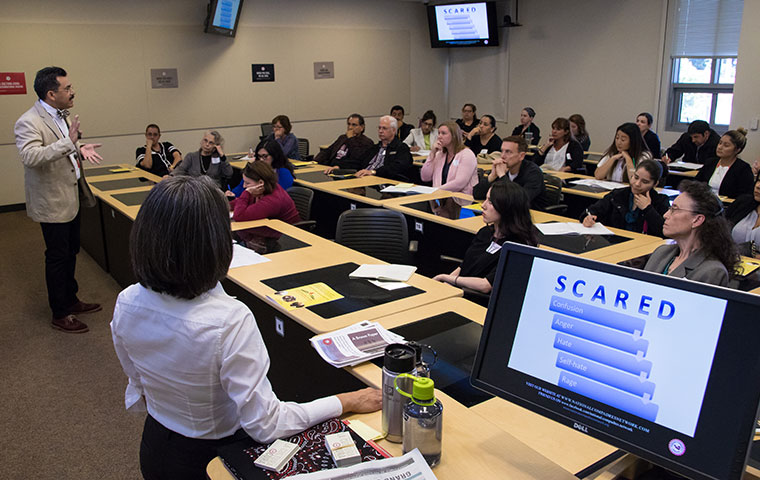
Amplifying the Language of the Disciplines
Arcadio Morales
The second annual Latino Education Summit imagined a better future for English language learners and all students.
The sounds emanating from the guitar, trumpets, violins, guitarron, and vihuela of the 20-piece mariachi group from the Alum Rock Union Elementary School District set the tone for the Second Annual Latino Education Summit: Silicon Valley. More than 250 people attended the event this year, helping to make the summit a rousing success.
Held on May 13, the summit—hosted by Santa Clara University’s School of Education and Counseling Psychology and the Foundation for Hispanic Education—focused on the theme “Amplifying the Language of the Disciplines.” The event served as a professional development day for educators wanting to improve their ability to serve Latino students, particularly English language learners (ELLs). ELLs are a diverse group of students who vary in their ability to communicate in English and their home language.
The summit opened with a keynote address by Kris Gutiérrez, Carol Liu Professor in the Graduate School of Education at the University of California, Berkeley. Her engaging talk focused on the importance of designing robust and equitable learning environments that can leverage students’ literacy repertoires towards meaningful and consequential learning. A key concept she introduced during her talk was “social dreaming”—imagining a better future for ELL and all students, utilizing the classroom setting to make it a reality.
Educators attended hands-on sessions, such as “Designing Next Generation Science Standards (NGSS)-aligned Lessons for English Learners in Elementary Schools,” “Advancing Latino Students through the Mathematics Pathway from Algebra 1 to Calculus,” and “The Language and Literacy Demands of the Common Core ELA Standards: Realizing Opportunities for English Language Learners.” These sessions provided relevant learning and teaching methods to K-12 instructors from some of Silicon Valley’s public, charter, and Catholic schools. Two additional breakouts on the subject of immigration touched on legal and psychological issues facing immigrant children and families in these unpredictable political times.
Common themes throughout the workshops included contextualizing education so that it becomes transformative and generative for ELL students, transforming instructional approaches from a deficit to an asset model to enable educators to challenge the negative assumptions about ELLs, and scaffolding—constructing roadmaps and multiple levels of support to take students through several weeks and months of instruction.
The day closed with an instructional musical performance by Armando Castellano, French horn player for cultural equity and social justice, who describes himself as a musician, bilingual teaching artist, and arts advocate.
Photo by Kenneth Chong